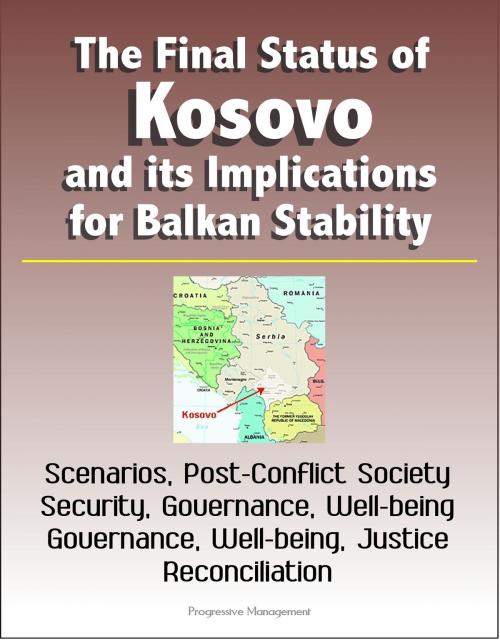The Final Status of Kosovo and its Implications for Balkan Stability: Scenarios, Post-Conflict Society, Security, Governance, Well-being, Justice and Reconciliation
Nonfiction, History, Baltic States| Author: | Progressive Management | ISBN: | 9781301968138 |
| Publisher: | Progressive Management | Publication: | September 4, 2013 |
| Imprint: | Smashwords Edition | Language: | English |
| Author: | Progressive Management |
| ISBN: | 9781301968138 |
| Publisher: | Progressive Management |
| Publication: | September 4, 2013 |
| Imprint: | Smashwords Edition |
| Language: | English |
This study presents the possible scenarios for the final political status of Kosovo, undecided since 1999, and the implications of these scenarios for the stability of the Balkans. In the beginning, basic elements of theory about the reconstruction of war-torn societies are presented in terms of such aspects as security, governance, economy, and justice. The goal is an understanding of the current situation in Kosovo, the challenges that the international administration had to handle when it arrived in Kosovo in June 1999, and its achievements and weaknesses till now. Finally, the possible scenarios for Kosovo's final status are examined and the one best for regional stability is suggested.
Contents: RECONSTRUCTION OF A POST-CONFLICT SOCIETY * A. GENERAL * B. SECURITY * C. GOVERNANCE AND PARTICIPATION * D. SOCIAL AND ECONOMIC WELL-BEING * E. JUSTICE AND RECONCILIATION * F. CONCLUSION * III. PRESENT SITUATION IN KOSOVO * A. BRIEF HISTORY * B. SIX YEARS OF INTERNATIONAL ADMINISTRATION OF KOSOVO * C. CONCLUSION * IV. SCENARIOS FOR THE FINAL STATUS OF KOSOVO AND THEIR IMPLICATIONS FOR REGIONAL STABILITY * A. GENERAL * B. NATIONALISM IN THE BALKANS * C. STATE CREATION * D. FUTURE SCENARIOS * 1. Scenario No 1: Kosovo Remains an International Protectorate Till the Full Membership of Serbia in the European Union a. Consequences for Regional Stability * 2. Scenario No 2: Kosovo Remains a Serbian Province with an Autonomous Status * a. Consequences for Regional Stability * 3. Scenario No 3: Cantonization/Decentralization. a. Consequences for Regional Stability * 4. Scenario No 4: A Commonwealth a. Consequences for Regional Stability * 5. Scenario No 5: Full Independence of Kosovo with Partition. a. Consequences for Regional Stability * 6. Scenario No 6: An Independent Kosovo with the Province's Current Borders * a. Consequences for Regional Stability * V. CONCLUSION
Kosovo's present situation is a stalemate. The security is fragile; in the area of governance more must be done as the democracy is weak, lacking the participation of all the minority groups. The economic conditions are poor with about 60% unemployment and an economy based on international aid. The judicial system is not yet consolidated and the achievement of reconciliation needs more time. Although a lot of progress has been made since 1999, it will take a long time to achieve the overall peaceful coexistence of minorities, economic prosperity, and the establishment of the rule of law. The recent violent events of March 2004 and the election as Prime Minister of an ex-KLA leader suggest that the effort for self-government is not on the right course for democracy, development, and reconciliation, which are not easy tasks by their nature.
Kosovo's final status will determine not only its own future and course toward development, but also all the other Balkan countries' stability, cooperation, and integration into the European structure. Most of these countries have many similarities with Kosovo, such as ethnic minorities and a fragile stability. All are relatively new and weak states with poor economic conditions and base their survival on foreign aid.
This study presents the possible scenarios for the final political status of Kosovo, undecided since 1999, and the implications of these scenarios for the stability of the Balkans. In the beginning, basic elements of theory about the reconstruction of war-torn societies are presented in terms of such aspects as security, governance, economy, and justice. The goal is an understanding of the current situation in Kosovo, the challenges that the international administration had to handle when it arrived in Kosovo in June 1999, and its achievements and weaknesses till now. Finally, the possible scenarios for Kosovo's final status are examined and the one best for regional stability is suggested.
Contents: RECONSTRUCTION OF A POST-CONFLICT SOCIETY * A. GENERAL * B. SECURITY * C. GOVERNANCE AND PARTICIPATION * D. SOCIAL AND ECONOMIC WELL-BEING * E. JUSTICE AND RECONCILIATION * F. CONCLUSION * III. PRESENT SITUATION IN KOSOVO * A. BRIEF HISTORY * B. SIX YEARS OF INTERNATIONAL ADMINISTRATION OF KOSOVO * C. CONCLUSION * IV. SCENARIOS FOR THE FINAL STATUS OF KOSOVO AND THEIR IMPLICATIONS FOR REGIONAL STABILITY * A. GENERAL * B. NATIONALISM IN THE BALKANS * C. STATE CREATION * D. FUTURE SCENARIOS * 1. Scenario No 1: Kosovo Remains an International Protectorate Till the Full Membership of Serbia in the European Union a. Consequences for Regional Stability * 2. Scenario No 2: Kosovo Remains a Serbian Province with an Autonomous Status * a. Consequences for Regional Stability * 3. Scenario No 3: Cantonization/Decentralization. a. Consequences for Regional Stability * 4. Scenario No 4: A Commonwealth a. Consequences for Regional Stability * 5. Scenario No 5: Full Independence of Kosovo with Partition. a. Consequences for Regional Stability * 6. Scenario No 6: An Independent Kosovo with the Province's Current Borders * a. Consequences for Regional Stability * V. CONCLUSION
Kosovo's present situation is a stalemate. The security is fragile; in the area of governance more must be done as the democracy is weak, lacking the participation of all the minority groups. The economic conditions are poor with about 60% unemployment and an economy based on international aid. The judicial system is not yet consolidated and the achievement of reconciliation needs more time. Although a lot of progress has been made since 1999, it will take a long time to achieve the overall peaceful coexistence of minorities, economic prosperity, and the establishment of the rule of law. The recent violent events of March 2004 and the election as Prime Minister of an ex-KLA leader suggest that the effort for self-government is not on the right course for democracy, development, and reconciliation, which are not easy tasks by their nature.
Kosovo's final status will determine not only its own future and course toward development, but also all the other Balkan countries' stability, cooperation, and integration into the European structure. Most of these countries have many similarities with Kosovo, such as ethnic minorities and a fragile stability. All are relatively new and weak states with poor economic conditions and base their survival on foreign aid.















